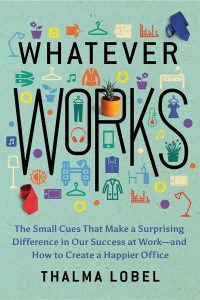Whatever Works book by Thalma Lobel comes with suggestions and improvements that you can make in your work environment. In today’s competitive market, where even tiny differences can be decisive, for both employees and organizations, exploiting such factors can make all the difference. Helpful for anyone from individual employees to managers to leaders of large organizations, Whatever Works shares valuable insights and practical takeaways to transform your professional life.
Latest Management Book Reviews
Whatever Works Book Summary
In ‘Whatever Works’, Thalma Lobel, one of the world’s leading experts on human behavior, explores groundbreaking psychological research on job performance, satisfaction, and creativity.
Did you know that the mere presence of a smartphone on your desk can lessen your performance, even if it’s turned off? That being in a warmer room makes you more likely to want to conform with the group, affecting your decision-making?
That just doodling in a certain way can increase your creativity? That looking at something green for forty seconds will improve your attention? That crossing your legs similarly to an interviewer could get you the job?
These are the invisible factors that nudge our behavior on a daily basis, and combined, have a real and significant bearing on our success-or failure-at work.
The more you know about the subtle elements that can help or hinder you on the job, the better equipped you can be to take control and navigate today’s competitive work world.
Whatever Works Book
Thalma E. Lobel is an internationally recognized psychologist who has served as the chair at the School of Psychological Sciences at Tel Aviv University. She has been a visiting professor at Harvard University, and a visiting scholar at Tufts University, the University of California at San Diego, and New York University.

Author: Thalma E. Lobel
Print Length: 312 pages
Publisher: BenBella Books (July 14, 2020)
Publication Date: July 14, 2020
ASIN: B07ZKZ76MC
ISBN: 9781950665099
Whatever Works Book Review
The current pandemic has uprooted many of us from our regular work environments and forced us to make do with whatever space we have. The alien environment with lack of suitable furniture and other environmental factors has disturbed the way we are used to and made us adjust. But this has also presented a big opportunity for employers to redefine our regular work spaces. In this book you will find little things that organizations can change to make their employees stress free and more efficient when they return to jobs.
The book approaches the subject of environmental factors from three different perspectives. The first part focuses on a larger environment and how we work big rooms. Although open offices concept has picked up in recent years and may solve some problems, it does not really offer better experience. The temperature, light and noise are often a factor that does not gel with everyone and cause more problems that it solves.
In the second part of the book, the author moves from environmental factors to group dynamics. Here the authors shown how we can make subtle changes to our teams and on the personal level how people can choose the right places and wear the right clothes to communicate at a subconscious level.
But we cannot blame it all on others. Our personal habits can be as damaging as external environmental cues. The third part of the book concentrates on how we interact with our various devices and our organization habits in physical and digital world. These routine tasks that we do not give much thought can affect our moods and efficiency at a much deeper level.
All thought the book, the author gives advice on how we can optimize the environmental factors within our control and personal habits with comprehensive evidence. The book is dense with information and rich in its resources. It is segregated well enough for you to jump directly to the section that you are concerned most at the time, and points you in the right direct deirection to affect change.